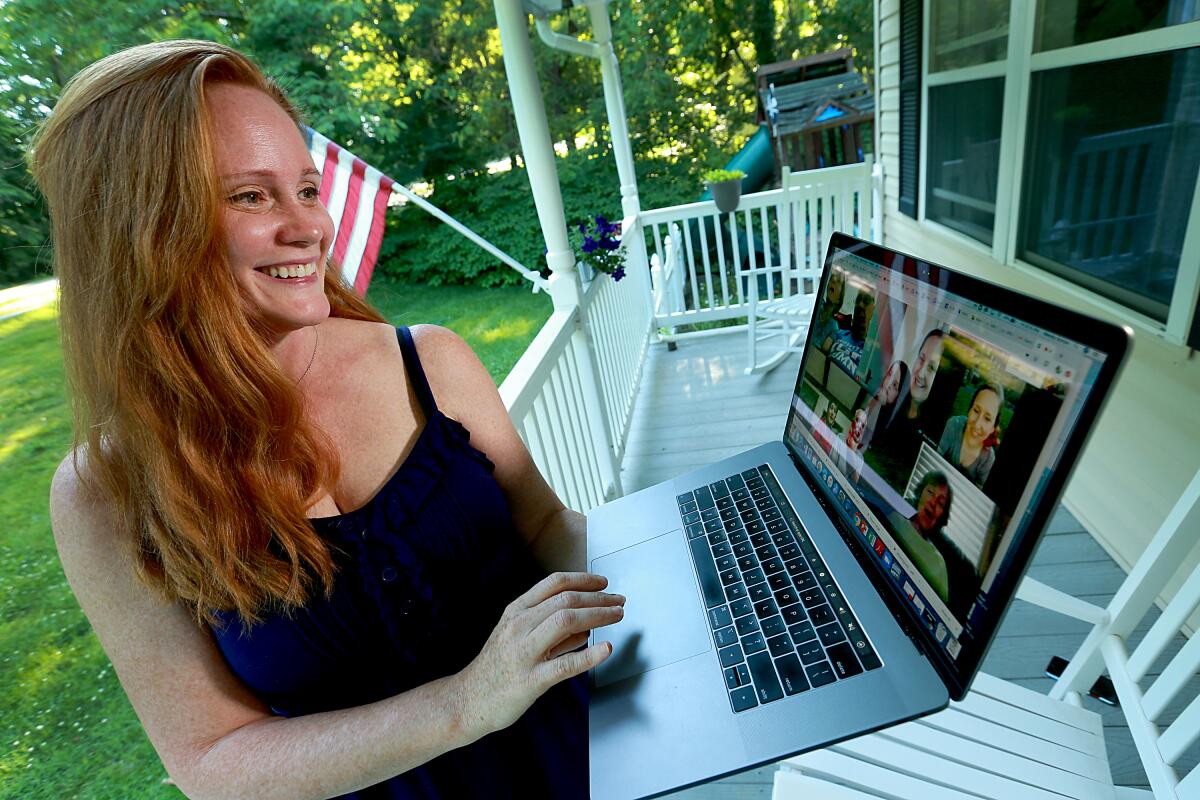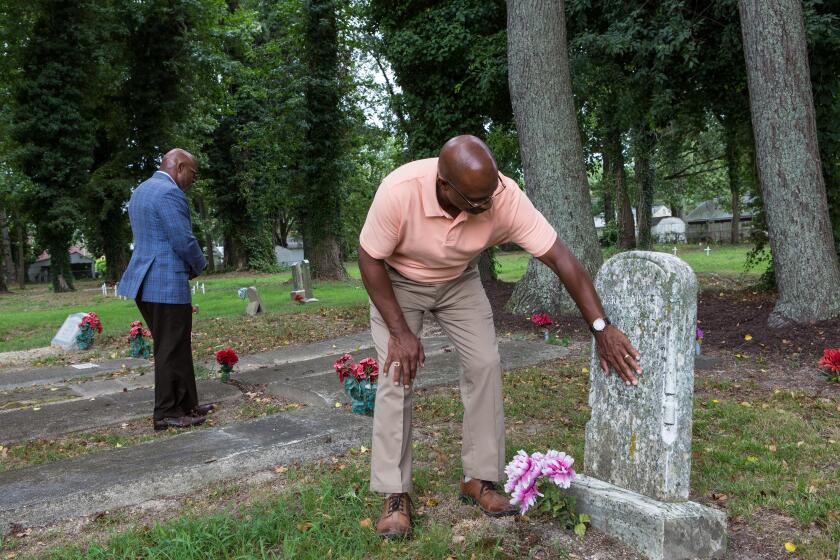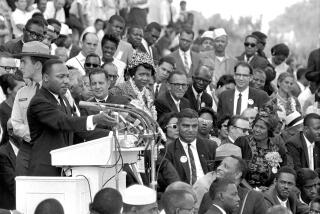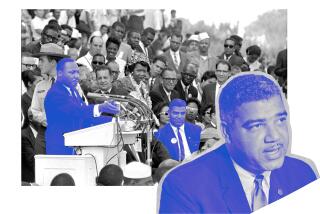Across the U.S., families are having tough talks about racism

- Share via
One night in late May, Wendy Bohon and her mom were piecing a puzzle together at the dining room table when they heard from the living room a news anchor’s somber voice, prepping his audience for what they were about to see.
Bohon knew the general details of George Floyd’s death in Minneapolis, the way his neck was pinned to the concrete by a white police officer for nearly nine minutes. But she hadn’t yet watched the video that would soon ignite a national uprising. And she didn’t know what her mom, a fifth-generation Virginian, might say about it.
The mother and daughter got up from the table, stood behind Bohon’s dad in his rocking chair, and watched.
Her mom’s reaction was immediate and visceral.”They murdered that man,” she said, tears filling her eyes.
“For me, that was like, OK,” said Bohon, a 44-year-old geologist who lives in Washington. “I see that we’re on the same page. You’re seeing what I’m seeing.”
That moment led to weeks of conversation between Bohon and her conservative-leaning family members about how racism still plagues innumerable institutions in the United States, 400 years after Africans were first brought to its shores.
August marks 400 years since the arrival of the first ship of enslaved Africans in the English colonies. For one African American family, the moment is personal.
As thousands have taken to the streets to demand accountability for police violence and rampant racial injustice, many non-Black Americans such as Bohon are for the first time investigating the ways in which they directly contribute to racism and how they might actively fight against it.
They are realizing that there is complicity in their silence around race issues. So now, they are breaking it. And they’re starting with family.
“Absent these kinds of conversations, the status quo wins,” said Patricia Devine, psychology professor and director of the Prejudice Lab at University of Wisconsin-Madison. “And the status quo is being revealed to us to be unacceptable in terms of costing people their lives only because of the color of their skin. That can’t stand.”
Frannie Kelley, a freelance radio journalist in New York, has been offering support and information to her white Instagram followers who are initiating such conversations in their own circles.
“Most of what I’m hearing about is people making sudden progress after years of incremental change,” she wrote in an email. “A friend of mine told me this weekend that her parents are finally hearing her, after a decade at least of saying the same things.”
It’s been reminiscent of the start of the #MeToo movement, she said, “where we were simply believed for a moment.”
Bohon could count on one hand the number of times she’d spoken with her parents about race. To keep the peace, they avoided topics that touched on an assumed chasm in perspectives (she and her sister, Angie, had fostered progressive ideals since they were teenagers).
And Southern propriety meant you didn’t talk about money and politics. “They saw those issues as politics,” Bohon said. “So I never really knew where they stood.”
There was a “real element of racism in my life growing up,” said Bohon, whose ancestors were slaveholders. Her grandfather wouldn’t let her watch the “Cosby Show” in his home because he believed that a well-educated, upwardly mobile Black family wasn’t realistic. Her parents were more tolerant, but they still had their prejudices, Bohon said.
Bohon, her husband and three kids were quarantining at her parents’ farm in southern Virginia when George Floyd was killed. Her aunts and uncles live nearby, too, and were often around. The adults watched the news together, and Bohon, who had spoken freely with friends and colleagues about racial justice, for the first time let her family know how she felt about police brutality.
To her surprise, she said, they were open to hearing her out. They talked about the skewed rhetoric around property damage during protests, and the vital role that Black Lives Matter has played in shaping the discourse around race since 2013. She sent her parents articles and social media posts about racism and what to do about it; in turn, they passed those resources on to their siblings.
As Bohon sat in the backyard with her mom and two aunts one afternoon, the conversation flowed from George Floyd to former NFL quarterback Colin Kaepernick.
“Now maybe you see why him taking a knee wasn’t a problem,” Bohon said of Kaepernick’s choice to kneel during the national anthem in protest of how Black people are treated in the U.S.
“I thought it was disrespectful, actually,” her aunt replied, reminding Bohon that her own father and grandfather were veterans.
Bohon took a deep breath. To her, it was obvious what Kaepernick was doing — it was peaceful resistance, the highest form of patriotism. She acknowledged that there are differences in the way older generations tend to interpret the meaning of the flag.
“He was making the point that what the flag stands for isn’t actually being delivered upon to millions of Americans,” she told the women. “And he did it at great risk.”
“I never thought about it that way,” Bohon’s aunt said.
White America, which in many ways benefits from systemic racism, has by-and-large chosen to look away from it. But the series of brutal killings of Black Americans in relatively quick succession — Ahmaud Arbery, Breonna Taylor and George Floyd — has made it “undeniable that there’s a problem white people have to solve,” said Devine, the University of Wisconsin-Madison psychologist.
A Civiqs survey showed a 15-point gain in support for Black Lives Matter among white people in just the last few weeks, reflecting the first time in the three-year survey that a majority of white respondents supported the movement.
Jason Hanasik, a 38-year-old documentary filmmaker in San Francisco, said his mom in Virginia can now be counted among the vocal supporters of the movement after he engaged her in many difficult conversations about race.
In a recent Facebook post imploring his friends to talk to their families about racial justice, Hanasik pointed out that many people in his family are racist, xenophobic and homophobic.
“Family gatherings during childhood could be straight up hellholes for me and my queer sister and then exhausting when we were old enough ... and started fighting back,” wrote Hanasik, who is gay.
So Hanasik saw an opportunity when he noticed that his mom was upset by Floyd’s death.
“I let her really get into her anger and sadness of what she saw and I said, ‘If you’re upset, here’s a way to direct the anger,’” Hanasik recalled. He pointed her to a phone tree where she could leave messages for elected officials in Minneapolis to demand justice for Floyd. She called the numbers that night.
“I’ve noticed you haven’t posted anything online,” Hanasik told her later that week. “You know mom, you live in Virginia, if you posted something it could change some hearts. ... Also, frankly, your silence is deafening right now.”
She was initially resistant, and the conversation got tense. Hanasik felt defeated.
Two days later, Hanasik’s mom sent him a draft of a Facebook post in which she planned to declare that Black Lives Matter. “If you have a problem with that truth, delete me as a friend,” she wrote. “This truth is non-negotiable.”
Aliza Luft, a sociology professor at UCLA who studies social movements and state violence, has been talking to her family about racism for many years, often bringing it up following her participation in Black Lives Matter protests, which she started attending after Trayvon Martin was killed in 2012. Recently, however, her family members have made a concerted effort to initiate the conversations and ask questions.
“I find that there’s a genuine curiosity and interest and care to remedy structural inequality that didn’t feel as urgent in the past,” she said.
Bohon is on that journey herself. She’s reading “How to Be an Antiracist” by historian Ibram X. Kendi, which has become a best-selling book on Amazon since Floyd’s death. In the text, Kendi explains that anti-racists express “the idea that racial groups are equals and none needs developing,” and they support policy that reduces racial inequality.
The principles of anti-racism call for action beyond posting a black square on Instagram. And talking to family and friends about their own racism is one of the most effective ways to shift public opinion, according to scholars.
Luft pointed to the gay rights movement as an example of how change can be created within families. Queer people have always been part of family systems and communities made up of mostly heterosexual people. Attitudes toward the group evolved, in part, because so many people cared about someone who had come out.
Racial discrimination works differently because Black and white people usually don’t have deep overlapping networks. So white people may be less likely to confront their biases except through conversations with their loved ones.
Such was the case for Patricia Hamilton, Bohon’s 68-year-old aunt. Until recently, she perceived more equity among the races than inequity, and she thought the rallying cry “Black Lives Matter” was divisive. Her daughter called her out for preferring “All Lives Matter.”
“Now I understand that it’s not something you should say because it’s racist, it’s ignoring the issues at hand,” she said in an interview.
After many long talks with Bohon and her daughter, Hamilton now believes that reforming police departments and taking away some of their responsibilities — such as mental health checks — is necessary, including in her hometown. She emailed Chesapeake, Va., Mayor Rick West to ask what’s been done to improve relations between the police and community.
“If he gives me a canned letter,” she said, “he’s going to get another one.”
Hamilton still has a lot to learn, she said, and she’s willing and excited to do so. She wanted to attend a local Black Lives Matter protest in early June, but her family, worried about her vulnerability to COVID-19, stopped her.
But Hamilton said she’ll be marching in the streets when it’s once again safe to do so. She knows that the future of the United States depends on people like her showing up.
More to Read
Sign up for Essential California
The most important California stories and recommendations in your inbox every morning.
You may occasionally receive promotional content from the Los Angeles Times.












